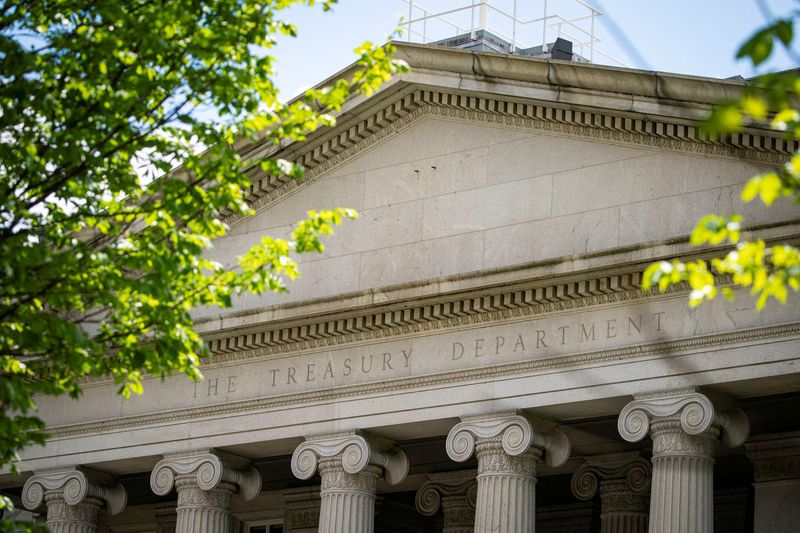[the_ad id="21475"]
[ad_1]
© Reuters. FILE PHOTO: The Treasury Department is pictured in Washington, U.S., April 25, 2021. REUTERS/Al Drago
By Karen Brettell
(Reuters) – The U.S. Treasury Department is at risk of defaulting on its debt if Congress doesn’t act to lift the debt ceiling before it is reached, which could happen as soon as June 1. For holders of Treasury bills, notes and bonds, that raises uncertainty over whether the issues they hold will be affected, and what happens if the debt is not repaid or an interest payment is skipped.
Here are six key questions:
DO ALL BONDS DEFAULT IF ONE PAYMENT IS SKIPPED?
No. Treasuries do not have any cross default provisions so a skipped payment on one issue will not necessarily impact others.
So far, moves in the Treasury bill market reflect localized concern over certain issues that mature in early June, when the U.S. Treasury Department is viewed as most likely to run out of funds. Yields on these bills are trading at higher levels than comparable debt that matures later in the year.
WILL DEFAULTED ISSUES STOP TRADING?
Analysts say it is critical that Treasuries can continue to be transferred on the Federal Reserve’s settlement system, the Fedwire Securities Service. The Treasury can ensure the securities remain on Fedwire by giving notice the day before that a payment will be delayed. It should do this daily until it can make the payment.
WILL DEBT HOLDERS BE COMPENSATED FOR THE PAYMENT DELAY
Analysts assume that debt holders will be paid for the delay, but its not clear exactly how this would work. JPMorgan (NYSE:) estimates that this would most likely take the form of a floating rate on missed coupon or bill payments.
The Treasury Market Practices Group said in December 2021 document, however, that “it would require explicit legislation by Congress to provide compensation to holders of securities subject to a delayed payment on Treasury debt for the delay in these payments.”
In 1979 the Treasury was late in redeeming some Treasury bills due to technical difficulties. Investors who missed their interest or principal checks were reimbursed for the delay.
CAN TREASURY ROLL OVER MATURING DEBT?
Yes. Treasury can roll over maturing coupon securities on the maturity date without affecting its outstanding debt or remaining cash balance as long as it makes the coupon payment due on the same day, according to JPMorgan.
Treasury bills are more complicated as they are sold at a discount and then repaid at par. Some analysts…
Click Here to Read the Full Original Article at All News…
[ad_2]
[the_ad id="21476"]
